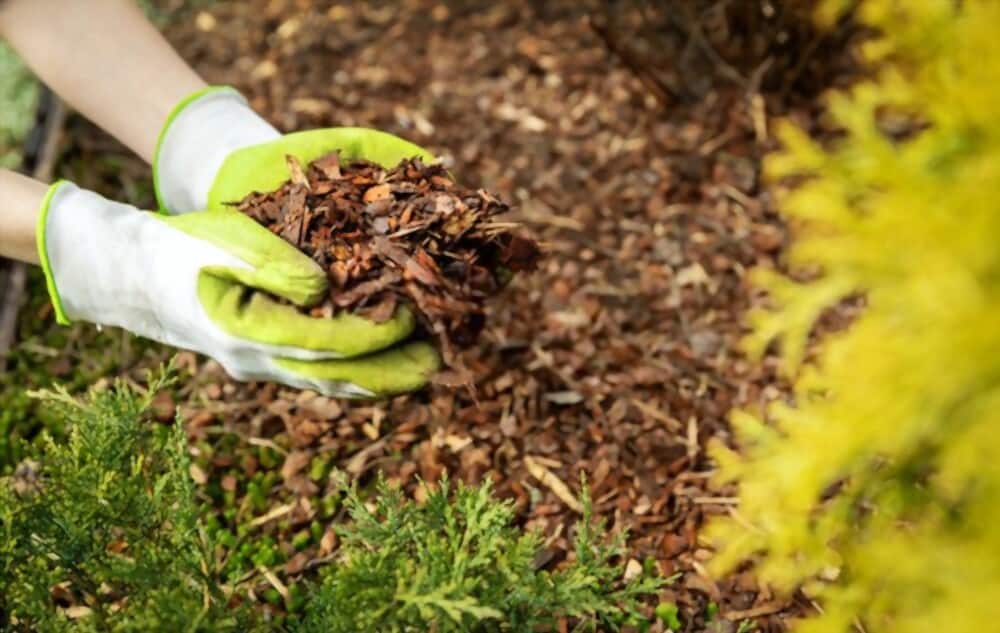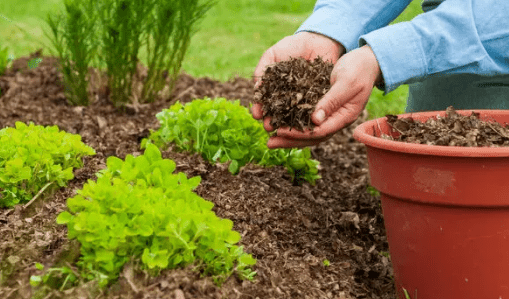
In my garden, I use mulch to keep weeds away from my plants. Maintaining it is essential since it aids in preserving the moisture in planting beds. Both organic and inorganic materials can be used to create mulches.
By creating physical barriers that keep mulch in a certain location or by increasing drainage around the garden, it is possible to stop mulch from washing away when it rains. Additionally, adhesive sprays can be used to firmly bind the mulch particles together, preventing both wind and water erosion.
Don’t worry if you experience this issue and are unsure of how to stop mulch from washing away when it rains; I have encountered it numerous times and have developed various solutions over the years, which will be discussed in this post.
For years, I’ve employed a spray-on mulch lock on my garden. As it keeps mulch in place that would have been easily washed away by rain, it saved me a ton of money. Clicking here will take you there!
Table of Contents
How To Stop Mulch Erosion?
Your garden could lose a lot of mulch if the necessary precautions are not done in time to stop the erosion of the mulch, which could be harmful for the healthy development of your plants.
Mulch can be kept from washing away when it rains in a variety of methods. Let’s go over a few strategies for preventing mulch erosion one at a time.
1. Use a Mulch Barrier
Another successful method for preventing mulch erosion is to utilize a barrier. You can halt mulch erosion by creating a solid, physical barrier at the mulch’s margins.
By preventing the flow of water that carries the mulch when it rains, barriers will keep mulch inside the garden.
In addition to aiding in halting mulch erosion, barriers also bring vibrancy to your garden.
To create a barrier around the boundaries of your yard, use stones or pebbles. Strong plastic materials are another option for barriers that are on the market.
These barriers come in a variety of designs and can also be used for decoration.
Here is a cheap barrier that I personally employ.
2. Use Mulch Lock
Mulch lock is an adhesive stabilizer that, by joining the bits of mulch together, lessens the amount of mulch that is lost due to wind and rain.
It comes in a ready-to-spray canister that may apply the adhesive directly to the mulch, safeguarding your plants from harm.
The adhesive lock begins bonding immediately and can last up to a year. It reaches its optimum bonding strength within 24 to 48 hours.
By clicking here, you may locate the mulch lock.
Here are a few more excellent, affordable, and practical solutions for mulch locks.
Mulch Anchor – Visit this pageMulch for Landscaping – Click here
3. Reduce Slope
if there is a sloped region in your landscape. To prevent mulch erosion, try to make your planting beds less sloped.
Water loves to run off steep slopes, thus they don’t appreciate having it there. A slope increases the speed of water flow.
And in doing so, it has a greater ability to degrade the mulch. It moves in this way, carrying nutrients and topsoil with it.
On the planting beds that are situated at the slope, try using mulch like shredded softwood. You can lessen the likelihood that topsoil and nutrients will be washed away after rain by doing this.
4. Use Different Materials For Edging To Keep The Mulch in Place
In addition to barriers, utilizing various materials for edging to keep the mulch in place, such as concrete pavers and rolls of plastic, can also significantly help to prevent mulch from washing away.
Concrete Pavers:
To keep the mulch in place in your garden, you can use concrete pavers as an edging. Additionally, they are simple to install.
Just make sure to level the entire area where concrete pavers will be installed before you begin to install them.
The market offers a variety of sizes and forms of concrete pavers in various styles. The only factor that matters is your preference. They can offer the yard a lovely texture.
Rolls of Plastic:
To keep the mulch in place, rolls of plastic can also be used as an edging material. Compared to concrete pavers, it is much simpler to mould rolls of plastic into a variety of shapes.
When opposed to concrete pavers, plastic rolls have the advantage of being relatively simple to maintain.
5. Use Heavier Mulch
You can also stop mulch erosion in your garden by using thicker mulch. Using a heavier-weight mulch is one of the greatest ways to keep it in place.
It will be challenging to wash away heavier mulch. If you reside in a rainy environment, stone and fresh wood chip mulches may be your best option.
Sand and rocks can also be utilized as mulch, which has its own excellent advantages for maintaining the soil.The thorough article I published on the advantages of using sand as mulch is available here.
6. Improve Drainage Around The Plants and Mulched Areas
Enhancing drainage around the plants and mulch area is another efficient method of preventing mulch erosion.
The drainage system that has been created in the gardens is essential in getting rid of the extra water there.
When it rains, there is very little danger that the mulch will be carried away if the drainage system around the garden’s perimeter is effective.
To have a good drainage system for the surplus water to move out, you can construct drainage pipes along the boundaries of your garden.
How To Recover Eroded Mulch?
Because mulches are fairly expensive, you cannot just let the water wash them away.
Unfortunately, if your mulch has already eroded and the soil is exposed, it can put plants that are growing in an area with a lot of rain in risk in a number of ways.
Redirect Water Flow To a Catchment To Recover Eroded Mulch
You can conserve money and still plant by recovering the eroded mulch.
Gardeners utilize a variety of techniques to recover the degraded mulch, and one of them is to reroute the water flow to a catchment.
This makes it simple to divert the drainage pipes you added to your garden’s flow to a catchment.
The nicest feature is that you may store washed mulch for later use in a catchment.
Lighter Mulch Will Wash Away Faster:

You should pay close attention to the mulch’s weight while employing it in your garden. Before choosing the sort of mulch for your garden, consider its topographic location.
Keep in mind that lighter mulch will wash away much quicker than heavy mulch if the planting beds are located on slopes.
Therefore, if you live in a rainy environment, it is strongly advised that you do not utilize lighter-weight mulches. When it rains heavily, lightweight mulches cannot keep up with the water’s rapid flow through the garden.
Use Heavier Mulch Options
In the market, there are numerous heavier mulch options. You can choose based on what your garden requires.
It’s acceptable if you don’t want to get rid of the older mulch in your garden. To enhance the amount of organic matter in the soil, you can layer the fresh mulch over the previous mulch or even incorporate it into the ground. See my in-depth essay on how to achieve this for more information.
Mulches that are heavier will retain rainwater significantly better than those that are lighter. To stop mulch erosion, we’ve gathered a list of the heaviest mulches now on the market that you can apply in your garden below:
Pebbles or Rocks:
Pebbles and rocks are a wonderful choice for heavier mulches due to their weight.
They require a one-time expenditure for the gardens because they are difficult to break down into the soil. You may also use this dense mulch to adorn your garden.
Your plants will be protected by pebble or rock mulch, which also gives your garden more life.
There is no need to worry that mulch will provide extra water to plant roots because pebbles and rocks won’t retain water.
Large Wood Chips:
Large wood chips are more heavier than most other types of mulch and can be the most effective in preventing mulch erosion.
Because they can absorb more water than any other mulch, these are beneficial for your plants as well.
The plant will be able to meet its water needs thanks to the wood chips’ stored moisture. On hotter days, the wood chips’ water reserves will also aid in keeping the soil cool.
Using Wood as Fences:
Wood would be one of the greatest materials to hold mulch in place. There are numerous styles and forms available. Simply put, it depends on your choices.
You can use shovels to dig your trench deeper. Make sure there is at least a half-inch to an inch of an edge still sticking up after you have dug down as far as you like.
Simply put, installing this option takes a little longer than other options. Wood is excellent for straight lines, but if your garden has slow twists, this is probably not the material for you to utilize.
The Takeaway
Mulch is essential for keeping moisture in the soil and preventing erosion in our gardens.
If the right safeguards aren’t in place, that same mulch can also disintegrate extremely quickly.
Mulch barriers are excellent in stopping water erosion caused by rain. Another excellent technique to prevent loss is to avoid slopes and divert drainage so that flowing water does not come into touch with the mulch.
– Plant your slope. The most promising accent of any yard, plants can add some serious personality to your slope. … The best aspect is that cleaned mulch may be stored in a catchment so it can be utilized again in the future.
FAQ
Why does my mulch wash away?
Always keep in mind that lighter mulch will wash away much quicker than heavy mulch if the planting areas are located on slopes.
How do you make mulch stay in place?
It is therefore strongly advised that if you reside in a rainy environment, you do not use lighter-weight mulches. Heavy rains make it impossible for lightweight mulches to keep up with the water’s rapid flow through the garden.
How do you keep mulch from washing off on a slope?
Heavy mulch alternatives come in a variety of weights and are readily available. Depending on what your garden needs, you can choose.
How do you landscape a sloped hill?
It’s okay if you choose not to get rid of the older mulch in your garden. To enhance the amount of organic matter in the soil, lay new mulch on top of existing mulch or even mix the two together. To learn how to achieve this, see the comprehensive essay I wrote.
